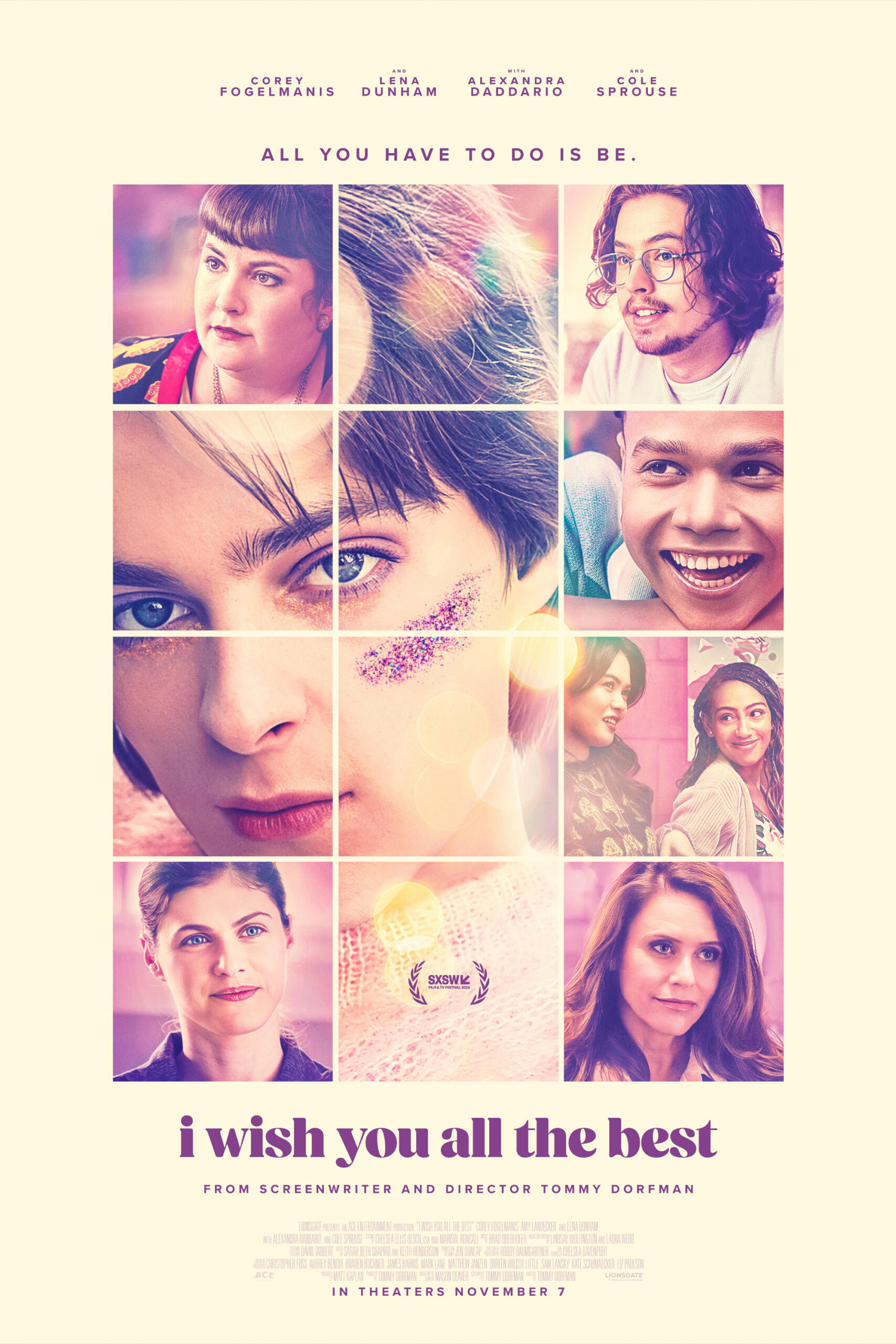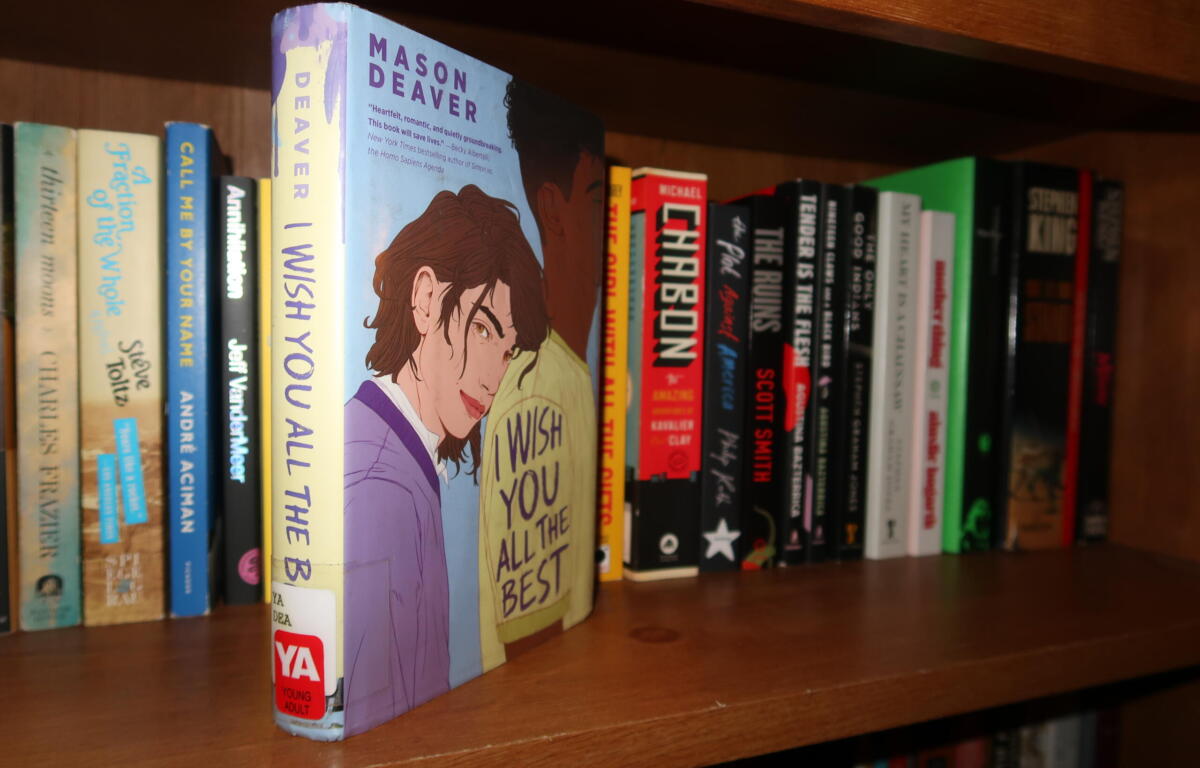RALEIGH, N.C. (828newsNOW) — “I Wish You All the Best” is a 2019 coming-of-age novel about Ben DeBacker, a nonbinary teen grappling with anxiety, family and first love after coming out to their unaccepting parents. The novel is set in Raleigh, N.C. and written by Mason Deaver, a nonbinary, North Carolinian author and librarian.
On Nov. 7, 2025, a film adaptation of “I Wish You All the Best,” written and directed by Tommy Dorfman in her directorial debut, will be released by Lionsgate in select theaters nationwide. The film stars Corey Fogelmanis as Ben, Miles Gutierrez-Riley as their love interest, Nathan, Alexandra Daddario as their older sister, Hannah, Cole Sprouse as Hannah’s husband, Thomas, and Lena Dunham as Ben’s art teacher, Ms. Lyons.
In advance of the film’s release, 828newsNOW sat down with Deaver for an interview about book-to-film adaptation, the importance of the word “y’all” and more.
This interview has been lightly edited and condensed for clarity.
An interview with Mason Deaver
Q: When did Tommy come to you about this book? Or did you approach her first?
A: She messaged me first on Instagram, like, maybe a week after the book came out. She told me about it at first. I love her; I’ve never seen a single episode of “13 Reasons Why,” so I had no idea who she was at first, but quickly, I learned!

But it was probably about a month later that I was going to New York for the first time for “I Wish You All the Best” – there were these conventions called BookExpo and BookCon that went away for awhile, but I think they’re finally coming back – and we met for coffee.
We just chatted at first, but then the conversation obviously turned to adapting. This was when Tommy identified as nonbinary, this was before she had even considered being the director. Like, I remember her specific phrasing. She was like, “However I have to use myself to get this thing in here, to get this thing made.”
So, it was kind of a whirlwind, and it’s been a hot minute. There were some times there where I thought maybe it’s not happening, maybe it’s done, but, yeah, it’s hard to believe how far it’s actually come.
Yeah, it did happen! Congratulations, that’s huge. This is your first piece of writing that’s been adapted into a movie, right?
Yes, yeah.
How does that feel for you, seeing a story that seems so personal to you and your experience as a North Carolinian, as well as a queer person and as a nonbinary person, translated into someone else’s hands, with some differences, too?
I mean, it’s surreal, and I hope it never gets old. I’ve seen it three times now, and, yeah, I never get tired of watching it. I still laugh at the same jokes I always laugh at. I still cringe at the right time.
Something I was interested in hearing your opinion on was the decision to take out a lot of the anxiety that Ben struggles with in the book, which is pretty fraught with it – the panic attacks and the constant self-questioning – and to move away from that in the movie, which I think is more joyous. Is that a conversation y’all had in why that decision was made?
No, not really. When it came to [Tommy] adapting it, she was so collaborative in showing me versions of the script, major updates, changes she had made. She always wanted my input to make sure the heart of the book had still made it into this script. But, I also always assured her at every turn that this was also her project. It was just based on my work.
This is her movie. This is her script, and also, as a big movie fan, I was all too aware of the fact that scripts and books are two vastly different things, and the time constraints are a lot tighter for a script. So, I always assured her that as long as the heart of the book is there, I don’t think it matters that much what she has to cut out, what she has to trim.
She wanted this Southern story of a queer Southern teenager finding queer Southern love.
Also, I mean, to your point about it being more joyous, that was not a discussion we had, but I remember her talking about it at South by Southwest in the post-interview of the premiere. The first version of the movie that I saw, it did have a lot more of those feelings ramped up, and a lot more tension between Ben and Nathan at some key scenes that she ended up changing because of the change in the political scape. She wanted to make something with trans characters feel a little happier and have it end on a much more cheerful note.
Something that I loved is that at the heart of this book, there is a pretty strong Southern character. Either the first or second line of dialogue in the movie is even, “Hey, I want to talk to y’all about something.” I love that the “y’all” made it in there. What about this story to you is Southern and why was it so important for you to situate it in this regional context?
I mean, it was important because it’s where I come from. The small Southern town is where I grew up. Especially in the book, I share a lot of the experiences of Ben not having queer heroes and queer elders to really look up to or have an example to follow.
But, even when it comes to the movie, I think the book being written by me, someone who is from the South, and the movie being made by Tommy, someone who is from the South, I think worked perfectly with one another. Because of dialogue, because of beats like that, where she knew the word that would be used.
Even down to the costuming, it’s just perfectly Southern, I think.
I heard her talk about it a little bit before the premiere this past weekend, where she wanted that Southern perspective. She wanted this Southern story of a queer Southern teenager finding queer Southern love. I’ll forever be grateful for her keeping that in mind, especially as I’ve grown older and I’ve kind of grown to reevaluate and appreciate where I come from, and the experiences that I got to have being a closeted teen in the South. I don’t know. I’ve gotten to re-contextualize it in my own way and this movie feels like I get to help other people do that as well.
But, I mean, even during the premiere, there were certain costume notes that I noticed. I was like, oh, of course, the Southern mom would wear that color pink with that pattern top. So, even down to the costuming, it’s just perfectly Southern, I think. Which I love. [laughs]

It felt very authentic, which was great. I was so surprised, I was watching the credits, and when it said “filmed on location in Los Angeles,” I was like, that’s the Raleigh skyline! They do a really credible job.
They did go to Raleigh for some scenes, I know. Especially Tommy and Corey [Fogelmanis] specifically, I think they went.
I felt it. It was very, like, the Leonardo DiCaprio pointing at the screen meme.
I think I recognize my best friend’s old apartment in one of the skyline scenes. [laughs]
I love how music is used in the movie. That is such a big part, I think, of the film’s identity. It has a killer playlist, I really loved all the songs. I was wondering if there was a playlist or music, and if not music, maybe more broadly artists, that strongly informed this story for you while you were developing it.
There is a playlist somewhere on Spotify that I can’t even fathom what is on it. The only song that I can tell you for sure is probably “The Good Side” by Troye Sivan.
I love that song.
That’s in the book. I don’t namedrop it, but.
Honestly, I do love listening to music while I write. It’s a core part of the experience for me, just because there is some artists that I gravitate towards that write about, specifically, love, romance, yearning. Like, all of these things that I love to write about.
Like, Carly Rae Jepsen is a very specific example for me. I adore her. She writes about love and feeling in love and, like, the pain and the pleasure that sort of comes with it, better than anyone else. SZA is another artist for me, the way she writes about emotion.
I do love listening to music while I write. It’s a core part of the experience for me.
I mean, yeah, it’s a core part of the writing experience for me, so I was really glad that [Tommy] was able to put so much of, at least what I think, songs that I think could have been on my writing playlist into the actual finished product.
Just one more short question. If there is something that you would say to the enby teens or the queer teens in North Carolina that may be struggling with these same sorts of things, to encourage them to seek out this story and this film in particular, what would that be?
I just hope they get the chance to feel seen. I know it’s so hard, especially these days in this current political climate, it’s so hard to be a trans teenager and to feel understood and seen. And so, I hope they get that from not just the movie, but the people they get to go see it with. Whether there is a group with friends or just strangers in the theater, I hope they get to feel that community for just a little bit.
For more information about “I Wish You All the Best,” visit www.instagram.com/iwyatbmovie.


